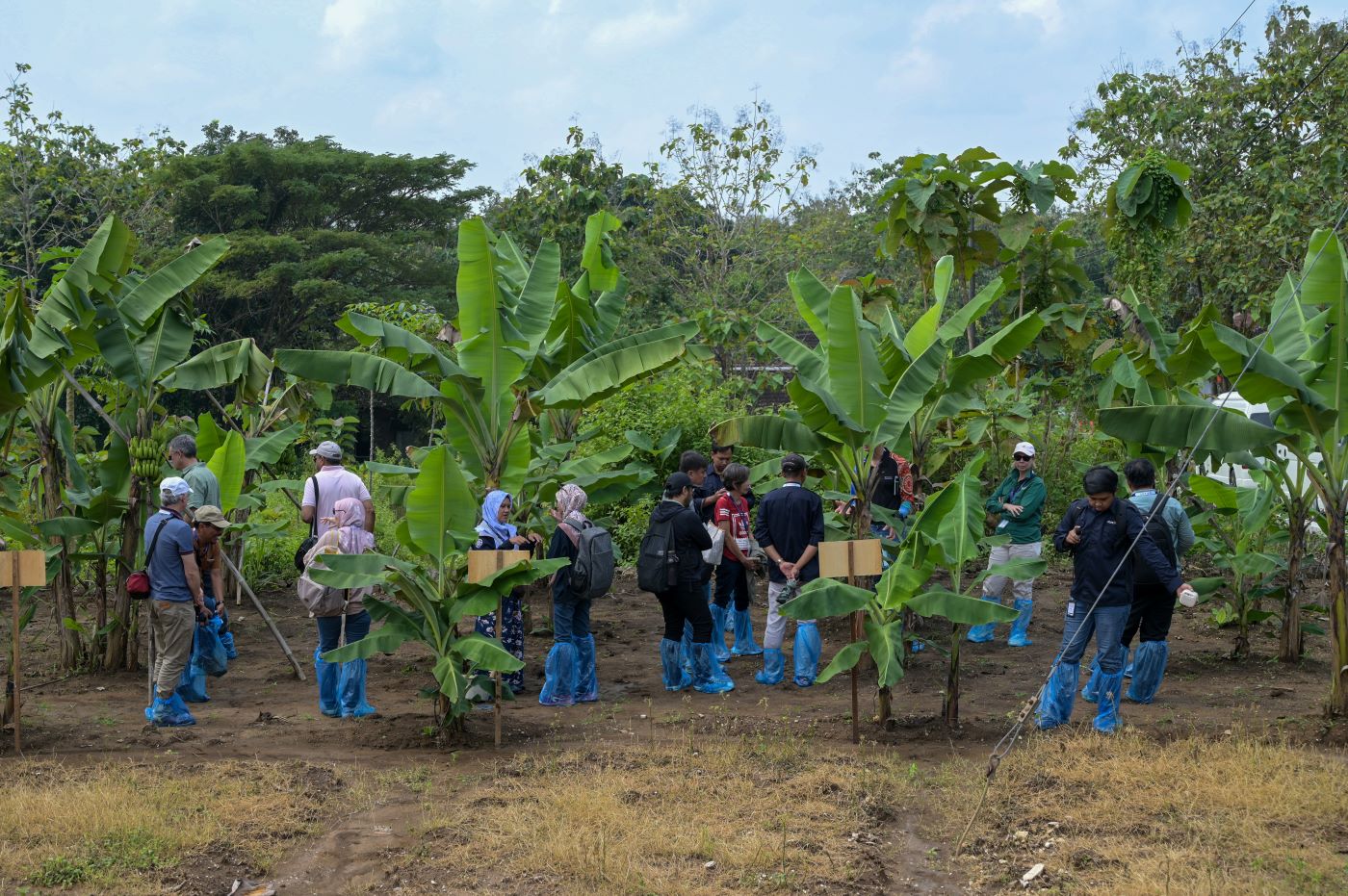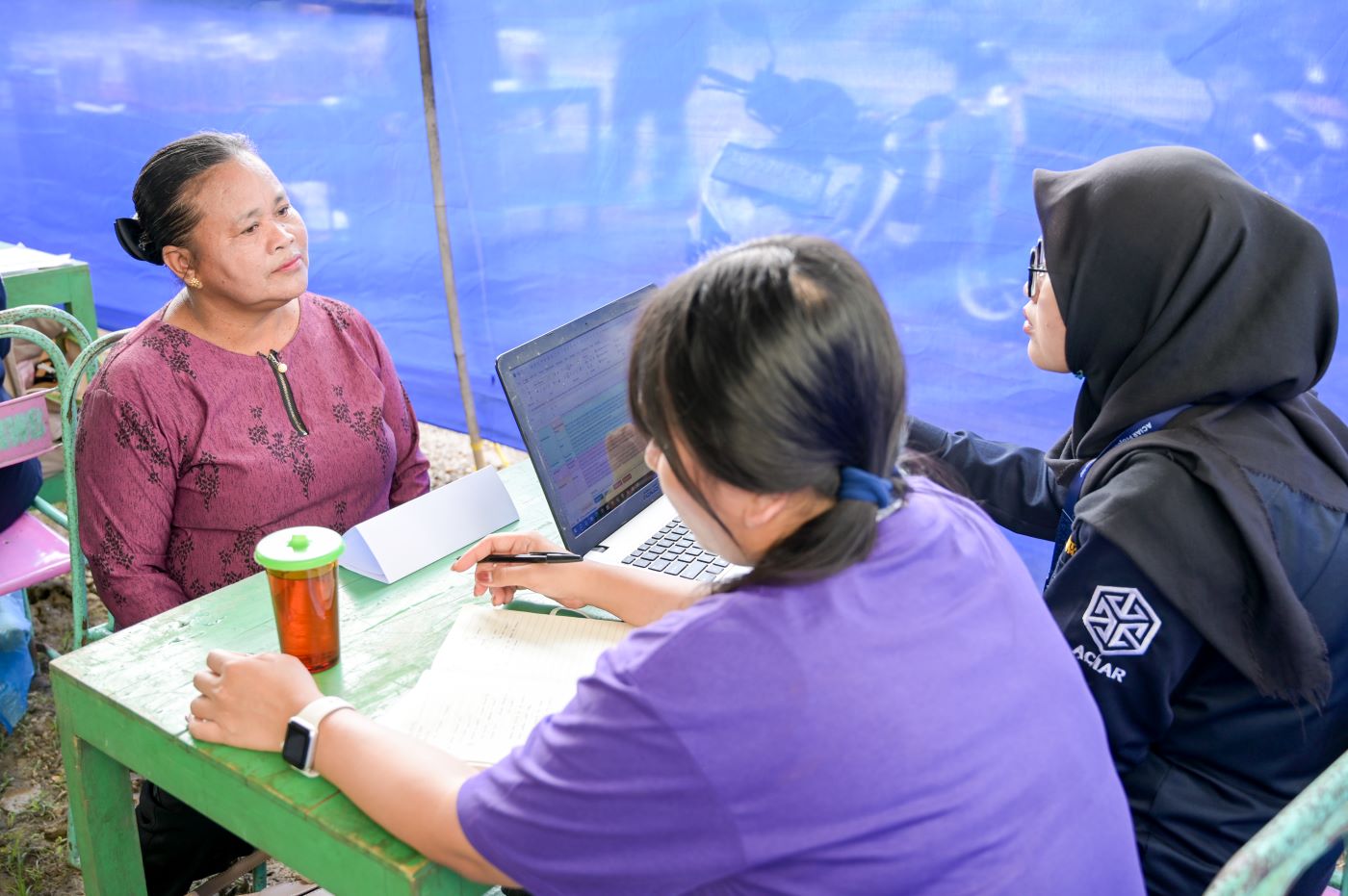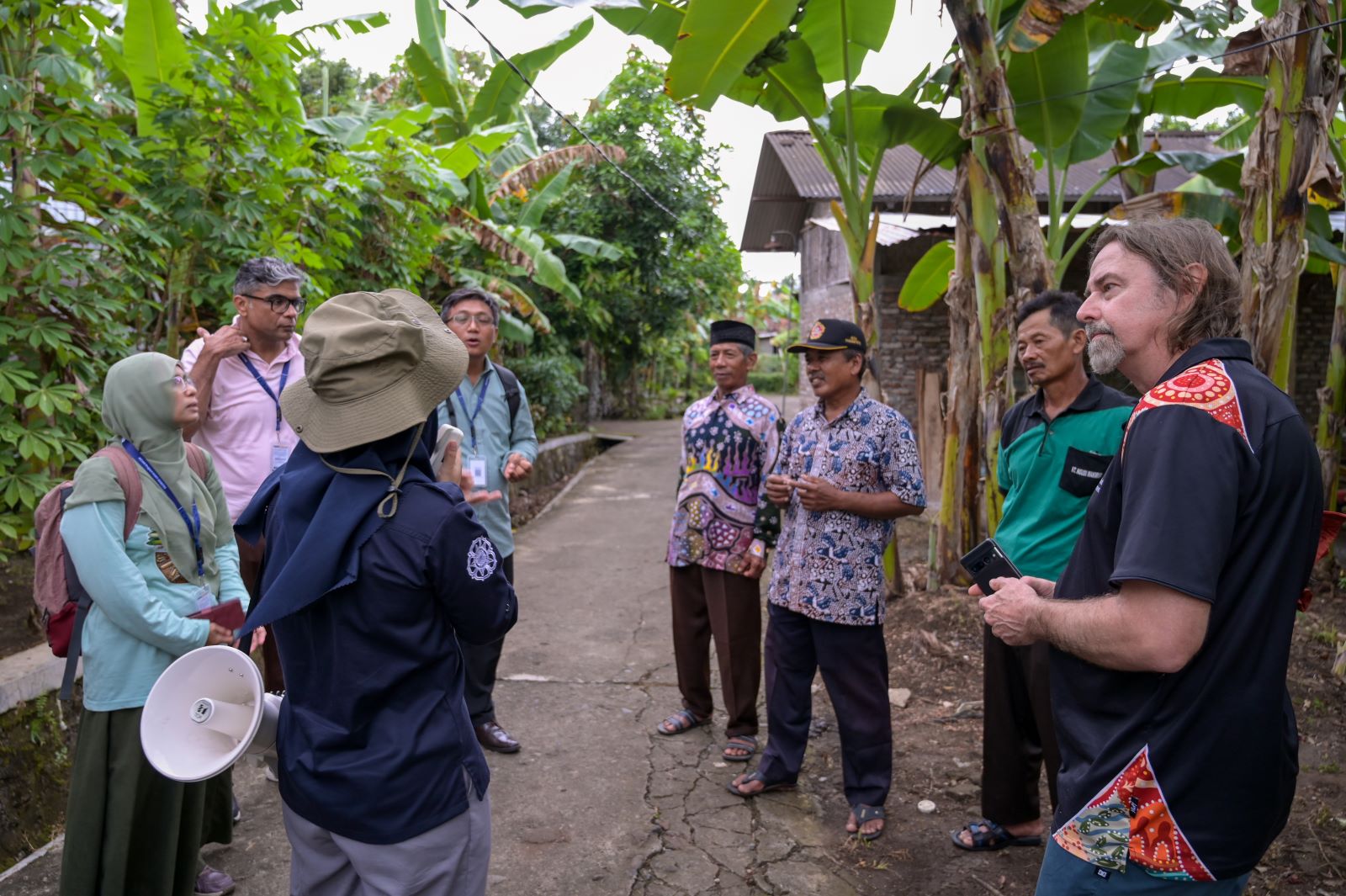Two ACIAR-funded projects have provided smallholder banana growers across Southeast Asia and Australia with the knowledge and tools to protect livelihoods and national banana industries from losses caused by the presence of Tropical Race 4 (TR4), an aggressive type of the highly contagious and hard-to-control Fusarium wilt disease.
Fusarium wilt is a serious banana disease that affects farms around the world, including Indonesia, Laos, the Philippines and northern Australia. The TR4 strain now threatens the Cavendish banana, the most widely consumed variety worldwide. The disease spreads easily through soil, water, tools and infected plants. Once it is in the ground, it is nearly impossible to eliminate, leading to yellowing leaves, wilting and eventually plant death.
Led by the Department of Primary Industries, Queensland and Universitas Gadjah Mada, the projects studied microbes, such as bacteria and fungi, that live in and around banana plants and identified which microbes can help protect and keep banana plants healthy. Project partners included the Australian Banana Growers Council, the Horticulture Research Centre, Laos, Plant Protection Center, Department of Agriculture, Laos, Provincial Agricultural Office-Rigion XI, Davao Del Norte, Philippines, University of Queensland and University of Southeastern Philippines.
Teams of researchers worked closely with banana growers to trial and look at how different farming methods, like rotating crops, improving soil and keeping farms clean, can change these microbes.

They also explored how farmers make decisions and the role of men and women in banana farming. This led to the development of the Fusarium Wilt Integrated Risk Tool. The tool is a practical Excel-based model that helps banana growers evaluate and manage the risk of Fusarium wilt based on current farm practices. The tool uses a scenario-based approach. As banana growers answer questions about their farm practices (such as hygiene, planting materials and water management), the tool guides them in choosing the best ways to manage the disease and protect their crops.

'ACIAR, as part of Australian Official Development Assistance, invests in building agricultural research capacity in our partner countries for the benefit of smallholder farmers. We aim to link Australian expertise with partner country research institutions to address an important issue in agriculture and together address the issue, thereby learning by doing together,' said ACIAR Research Program Manager, Horticulture, Dr Sandra McDougall.
'This banana fusarium project is an example of addressing a pressing issue for Indonesia and Australia as well as the other partner countries, Philippines and Laos.
Collaborating to protect livelihoods
'Bananas play such an important role in the lives of people throughout Asia,' said project leader with the Queensland Department of Primary Industries, Dr Tony Pattison, reflecting on the broader significance of the research initiatives. 'With Fusarium wilt threatening farmers' livelihoods, it is important for our research to capture the diverse cultural context and circumstances surrounding each banana farm,' added Dr Pattison.
Dr Pattison also emphasised the collaborative nature of the initiatives. 'By partnering with science and social research teams embedded in banana growing communities in Indonesia, Laos and the Philippines, we can ensure that the research remains relevant to local needs,' he said. 'We have always had the banana growers in mind, to ensure that we make lasting improvements in their livelihoods.'
In Indonesia, the projects help protect valuable banana types like Barangan and Ambon, which are easily affected by TR4, by encouraging crop rotation and using natural, helpful microbes to reduce disease in the soil, potentially saving US$630 million (over A$970 million at time of publishing) in losses, according to material presented at the final project meeting.
Regional impact
Speaking on the significance of the project for Indonesia, project leader with Universitas Gadjah Mada Professor Siti Subandiyah said the project has been instrumental in helping smallholder banana farmers in Yogyakarta Province manage Fusarium wilt TR4. It has also helped strengthen the whole banana industry, from field production to collective post-harvest home-based enterprises. 'Smallholder banana farmers in Yogyakarta Province are earning better incomes from cultivating bananas in their front and backyards,' said Professor Subandiyah, adding that while bananas are not a primary crop, the extra income the generate contributes to improving livelihoods by supporting access to healthcare and education.'

'By sharing with the ACIAR project team and other banana growers, I have learned more about banana diseases and how to manage them,' said Mrs Tri Sumarsiwi, a smallholder banana grower with the Ngudi Makmur Samiran group in Bantul Regency, Yogyakarta Province. This has helped me improve my farming, reduce wilt, grow healthier bananas, and increase my harvest and income.'
In Laos, the projects encouraged farmers to grow a mix of crops and use soil-friendly practices, which also support the country's goals for sustainable farming.
Meanwhile in the Philippines, the projects helped farmers to continue growing high-quality Cavendish bananas by using better farming methods and helpful microbes, which protect their income and support banana exports.
Benefits to Australia
In Australia, where the project reported uncontrolled spread of TR4 could lead to losses of up to A$150 million, the project has informed Biosecurity Queensland and the Australian Banana Growers' Council protocols. The new tool also helps engage growers in proactive disease management.
'The projects demonstrated that empowering banana growers with both scientific insights and practical tools can lead to more informed, confident decisions about Fusarium wilt TR4 management,' said Dr Pattison. 'By integrating science, on-farm practice and social engagement, the projects have laid the groundwork for more resilient banana production systems across Southeast Asia and beyond.'
Building on the experience of the project, Dr McDougall said she was very excited by what the team has achieved together. 'An excellent ACIAR project is a true collaboration between research, development and extension (RDE) teams in our partner countries and Australia. As a key benefit to Australia, these projects give confidence to the Australian banana industry that we can continue to prevent the spread of Fusarium wilt TR4, have the tools and management practices to build soils that can suppress the disease, as well as build a resilient banana production system.'
ACIAR Projects: 'An Integrated Management Response to the spread of Fusarium wilt of Banana in South-East Asia' (HORT/2018/192); 'An Integrated Management Response to the spread of Fusarium wilt of Banana in south-east Asia - Indonesia Phase' (HORT/2022/178)






